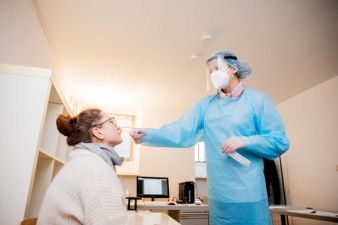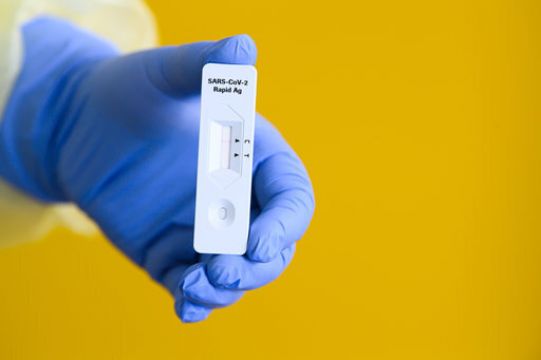Affordable antigen testing options could be crucial in the reopening of hospitality businesses in Ireland, according to the medical director of a Cork-based Covid testing company.
The Covid-19 antigen test uses a swab to take a sample from your nose; however, the sample does not need to go to a lab and the results are back within 15-20 minutes.
Antigen testing is quicker but less reliable than PCR testing, which looks at the genetic material of the virus in a lab and is the most reliable way of knowing if you are currently infected.
While PCR testing remains the gold standard when it comes to Covid tests, antigen tests are being considered as an option for hospitality businesses to reopen while they have already been used in office and corporate settings.
Tests
Dr Nick Flynn, medical director of Sure Rapid Testing, spoke to breakingnews.ie about how affordable antigen tests could help businesses with reopening.
“We’ve been running these tests in various settings for eight or nine months, we’ve done 35,000 tests at this stage, and we’ve done predominantly antigen testing,” he explained. “We’ve been applying antigen testing to asymptomatic patient cohorts. We’ve tested in a village, in a drive-through setting, we’ve tested in schools, in nursing homes, in hotels and in corporate settings including offices, warehouses and factories.
“From multinationals to small solicitors' offices, we’ve adapted to all the environments that we’ve been asked to adapt to.
“We have mobile teams, so we can respond quickly to a workplace or a community organisation setting where a positive case has been identified, and they want somebody to come in and test 100 people the next day, we can respond to that.
“Antigen testing is best suited to serial testing, so we’ve worked with healthcare groups, nursing homes, offices and factories on the basis of weekly or twice weekly antigen testing.
“The testing that we’re doing, which we are very clear on, does not give anybody an excuse not to follow the prevailing public health advice, so this is not permission to have a party or break regulations.
“It allows you to do what the public health advice allows more safely.”
Health passport
“We’ve aligned with the health passport worldwide app, so if a client wants we can use that technology for result management; equally some people don’t want that, and they just want a text message, a more traditional communication with those tested,” said Dr Flynn.
“We’ve done thousands of PCR tests too. So what do antigen tests have that they don’t? PCR tests are expensive, you need a lab, so they can’t move generally. PCR testing tends to be more expensive, less flexible and the results are slower.
“PCR testing is more accurate. With antigen test you lose a bit on the accuracy, but it’s an affordable test that you can apply repeatedly to a test group for quick results.
“A factory may decide that they can do antigen testing every week on 100 people and that would cost them a fraction of the cost of doing PCR testing.
“I think antigen testing can help us reopen society more safely.”
We’re working on a model with hospitality partners where we can get the testing down to under €10, where we’ll supply the test with clinical governance pathways to the hospitality site.
Dr Flynn also spoke about the early stages of planning his company has been engaged in with a number of hospitality partners.
It would involve self-testing, with a member of staff to oversee it, but overall Dr Flynn thinks it could be a very manageable solution.
“Say three or four people want to go for a pizza and a bottle of wine, and it’s going to cost €20 or €25 per person, you’re not going to pay €400 on top of that for a PCR test, so that’s out. Even if an antigen test [for the group] is €80, you’re not going to pay an extra €20 per head for a pizza and glass of wine.
“We’re working on a model with hospitality partners where we can get the testing down to under €10, where we’ll supply the test with clinical governance pathways to the hospitality site.
Testing area
“Basically if it was a restaurant, they’d have a testing area on the way in, people would do the test, a self antigen test, they would self test and because they’re doing it themselves there’s less PPE needed, but there would be a supervision role from the hospitality site, so they would have to commit a physical resource to the area for testing and a staff member in a supervision role; but the people would basically test themselves.
“It’s an idea that might allow indoor dining to take place more reasonably.
“Providers, Government, everybody has to realise that this won’t work unless we can make it affordable. Even €20-25 is too much, in a corporate setting to allow business activities to take place that might be reasonable but on a personal or social setting you wouldn’t do that often. Maybe for a big birthday, but on a normal Saturday night two parents and two kids are not going to pay €100 for antigen testing to allow them to have a meal.”
He feels a model can be devised to make sure that safety standards are still met in this type of scenario.
“We have to work around a model that safely facilitates the test at as economical a price as possible but where standards are still applied.
“The process, the test, is performed according to the manufacturers’ guidelines, so there has to be supervision, that the test is identifiable to the person; so people can’t be swapping tests. It is very important also that there is a pathway for managing positive tests.
“You can’t have somebody going to a restaurant, finding out that they’re positive and then going to get the bus home.
“We need to have access to a medical professional who can explain the positive and arrange a PCR, and that can be a HSE PCR.
“We have a couple of partner sites in hospitality who are self testing their staff, but they’re doing it using PPE on staff they train themselves. That allows them to bring down the cost of testing.
Price sensitive
“It’s a very price sensitive process. We want to be a group that facilitates testing to help society open up safely within the prevailing public health guidelines.
“We also want to do it on a model that makes sense for us, so there’s some profit but not to the detriment of clients and customers, we want to make this an affordable and accessible process for everybody.
“So if people in the summer can spend maybe €36 on testing between four, rather than the other way which wouldn’t work.
“Hotels and restaurants need this because if they don’t get indoor dining back until the end of July, that could be curtains for a lot of businesses.
“May, June and July are the months you’d be expected to be able to eat outdoors, but after it will be difficult.
“I would see this as a medium term solution, once 80-90 per cent of the population is vaccinated then the risk for society changes and so does what we do. In the short or medium term this is an option to help people, businesses and the economy.”

While he feels Government should play a role in providing regulation for how it would be applied, Dr Flynn said it could then be the responsibility of individual businesses and testing partners.
Covid grants
“Government’s responsibility goes so far, public health, individual health systems. Their role is to validate the processes that public providers and businesses can use in the testing area.
“I don’t think Government needs to do the testing, but maybe there could be a Covid grant or support for companies that want to be involved in the testing process, and some way it’s co-shared.
“They could even subsidise each restaurant with €5 for the process to get down to €10 or €5 for a test, I don’t think anyone would mind that especially after the year we’ve had.”







